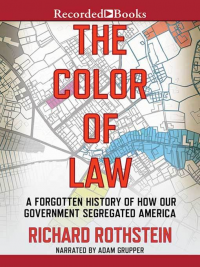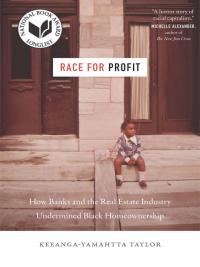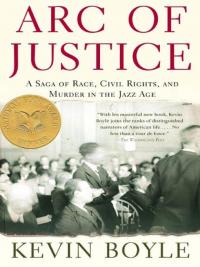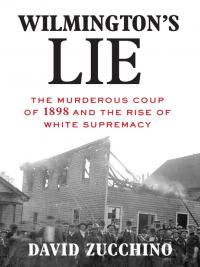Fair Housing Book Recommendations
Residential segregation in America didn’t happen by accident. Americans of different races live apart because of deliberate actions by public and private actors. NAR’s Director of Federal Fair Housing Policy, Bryan Greene, compiled this collection of fair housing titles to help NAR members deepen their understanding of how we became divided, and of the ramifications of living in a segregated society.
Don’t have time to read an entire book? Each recommendation also includes book reviews, interviews, videos and other tools to give you a quick recap.
The Color of Law
A Forgotten History of How Our Government Segregated America
By Richard Rothstein
One of Publishers Weekly's 10 Best Books of 2017
Longlisted for the National Book Award
In this groundbreaking history of the modern American metropolis, Richard Rothstein, a leading authority on housing policy, explodes the myth that America’s cities came to be racially divided solely through individual prejudices, income differences, or the actions of private institutions like banks and real estate agencies. Rather, The Color of Law incontrovertibly makes clear that it was the laws and policy decisions passed by local, state and federal governments that actually promoted the discriminatory patterns that continue to this day.
This title is available as an audiobook for NAR members as part of the NAR online library’s Fair Housing and Civil Rights collection. It is also available on the publisher's website, and on Amazon.com.
Tools and Resources for Readers
- Publisher’s Discussion Questions
- Segregated by Design – A 17 minute video exploring the book
- “A Powerful, Disturbing History of Residential Segregation in America” – New York Times book review
American Apartheid
Segregation and the Making of the Underclass
by Douglas S. Massey
“An incredibly readable book that must be studied by all Americans—liberal and conservative, black and white.” — D. K. Jamieson, Choice
“Essential reading for anyone interested in the causes, and possible cures, of urban poverty.” — Roberto M. Fernandez, Contemporary Sociology
This powerful and disturbing book clearly links persistent poverty among blacks in the United States to the unparalleled degree of deliberate segregation they experience in American cities. American Apartheid shows how the black ghetto was created by whites during the first half of the twentieth century in order to isolate growing urban black populations. It goes on to show that, despite the Fair Housing Act of 1968, segregation is perpetuated today through an interlocking set of individual actions, institutional practices, and governmental policies.
This title is available as an audiobook for NAR members as part of the NAR online library’s Fair Housing and Civil Rights collection. It is also available on the publisher's website, and on Amazon.com.
Tools and Resources for Readers
- Los Angeles Times book review
- “Apartheid American-Style” – summary in the Chicago Reader
- Author, Princeton sociologist Doug Massey, discusses segregation in America (6 minute video)
Race for Profit
How Banks and the Real Estate Industry Undermined Black Homeownership
by Keeanga-Yamahtta Taylor
2019 National Book Award Finalist
Finalist, 2020 Pauli Murray Book Prize, African American Intellectual History Society
By the late 1960s and early 1970s, reeling from a wave of urban uprisings, politicians finally worked to end the practice of redlining. Reasoning that the turbulence could be calmed by turning Black city-dwellers into homeowners, they passed the Housing and Urban Development Act of 1968, and set about establishing policies to induce mortgage lenders and the real estate industry to treat Black homebuyers equally. The disaster that ensued revealed that racist exclusion had not been eradicated, but rather transmuted into a new phenomenon of predatory inclusion.
This title is available as an ebook for NAR members as part of the NAR online library’s Fair Housing and Civil Rights collection. It is also available on the publisher's website, and on Amazon.com(link is external).
Tools and Resources for Readers
- “Two Histories of Financiers Profiting from Real Estate While Homeowners Go Belly Up” – New York Timesbook review
- “A Dream of Homeownership, Undermined” – New Republic book review
- “ Race for profits: Taylor’s research on ’70s urban housing crisis exposes a familiar history” – discussion of the author’s Princeton dissertation, the foundation of the book
Arc of Justice
A Saga of Race, Civil Rights, and Murder in the Jazz Age
by Kevin Boyle
In 1925, Detroit was a smoky swirl of jazz and speakeasies, assembly lines and fistfights. The advent of automobiles had brought workers from around the globe to compete for manufacturing jobs, and tensions often flared with the KKK in ascendance and violence rising. Ossian Sweet, a proud Negro doctor and grandson of a slave, had made the long climb from the ghetto to a home of his own in a previously all-white neighborhood. Yet just after his arrival, a mob gathered outside his house; suddenly, shots rang out: Sweet, or one of his defenders, had accidentally killed one of the whites threatening their lives and homes.
And so it began—a chain of events that brought America's greatest attorney, Clarence Darrow, into the fray and transformed Sweet into a controversial symbol of equality. Historian Kevin Boyle weaves the police investigation and courtroom drama of Sweet's murder trial into an unforgettable tapestry of narrative history that documents the volatile America of the 1920s and movingly re-creates the Sweet family's journey from slavery through the Great Migration to the middle class.
This title is available as an ebook for NAR members as part of the NAR online library’s Fair Housing and Civil Rights collection. It is also available on the publisher's website and on Amazon.com.
Tools and Resources for Readers
- Reader’s Guide from the Michigan Humanities Council
- “‘Arc of Justice’: I Swear It Was in Self-Defense” – New York Times book review
- Kevin Boyle speaks on C-SPAN Book tv (108 minute video)
Wilmington's Lie
The Murderous Coup of 1898 and the Rise of White Supremacy
by David Zucchino
By the 1890s, Wilmington was North Carolina’s largest city and a shining example of a mixed-race community. It was a bustling port with a burgeoning African American middle class and a government that included black aldermen, police officers and magistrates. There were successful black-owned businesses and an African American newspaper, The Record. But across the state―and the South―white supremacist Democrats were working to reverse the advances made by former slaves and their progeny. In 1898, more than 2,000 heavily armed Red Shirts swarmed through Wilmington, torching the Record office, terrorizing women and children, and shooting at least sixty black men dead in the streets. The rioters forced city officials to resign at gunpoint and replaced them with mob leaders. Prominent blacks―and sympathetic whites―were banished. Hundreds of terrified black families took refuge in surrounding swamps and forests.
This brutal insurrection is a rare instance of a violent overthrow of an elected government in the U.S. It halted gains made by blacks and restored racism as official government policy, cementing white rule for another half century. This is a dramatic and definitive account of a remarkable but forgotten chapter of American history.
This title is available as an ebook for NAR members as part of the NAR online library’s Fair Housing and Civil Rights collection. It is also available on the publisher's website, and on Amazon.com.
Tools and Resources for Readers
- Author interview on NPR’s Fresh Air with Terry Gross (37 minutes)
- “When White Supremacists Overthrow an Elected Government” – New York Times book review
- “Wilmington’s Lie’ Review: An American Tragedy” – Wall Street Journal (subscription required)
Additional Book Recommendations
The Warmth of Other Suns: The Epic Story of America's Great Migration (Kindle, eBook)
Sundown Towns: A Hidden Dimension of American Racism (Kindle, eBook)
Family Properties: How the Struggle Over Race and Real Estate Transformed Chicago and Urban America (Kindle, eBook)
The Fight for Fair Housing: Causes, Consequences, and Future Implications of the 1968 Federal Fair Housing Act (Kindle, eBook)
Black Wealth / White Wealth: A New Perspective on Racial Inequality








